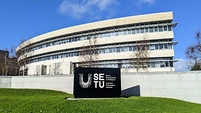'Completely unacceptable' that State unable to facilitate fair trial process with psychiatric reports - judge

Alison O'Riordan
A judge at the Central Criminal Court has expressed his sympathy to an "unfortunate" father who has attended court over 13 times, only to be told there is further delay in engaging a forensic psychiatrist to assess his wife, who is charged with the murder of their six-year-old son.
Mr Justice Paul McDermott said it is "completely unacceptable" that the State wasn't in a position to facilitate the trial process in securing psychiatric assessments within the State, but remarked that he could only express his frustration with this "inadequacy".
The judge said he hoped the executive "will act" to provide the services and set up "a reliable structure" for psychiatric assessments to see whether a mental condition could have played a role in a defendant's alleged offending.
Ruth Purcell Healy (37), of Bishops Field, Williamstown, Waterford, is charged with the murder of her six-year-old son Matthew Healy on February 9th, 2024. The child was found unresponsive around midnight near Rathmoylan Cove, Dunmore East, and was later pronounced dead at University Hospital Waterford.
Although psychiatric issues are explored in as many as 20 per cent of murder trials in Ireland, there is no legal obligation for HSE-employed psychiatrists to provide assessments for criminal cases.
While the Central Mental Hospital has a panel of experienced forensic psychiatrists employed by the HSE, they are under no contractual obligation to provide reports for either prosecution or defence teams. Currently, there is no definitive panel of psychiatrists available to lawyers to conduct assessments.
Addressing Mr Justice McDermott, the judge overseeing the trial list at the Central Criminal Court, senior counsel Brendan Grehan, for the Director of Public Prosecutions, said despite the best efforts of his solicitor the prosecution has been unable to attain the services of a consultant forensic psychiatrist in Ireland to prepare a psychiatric report on Ms Purcell Healy in response to a defence psychiatric report.
Counsel added: "That's despite her [the solicitor] having contacted over ten different psychiatrists and gotten a response from the interim director of the Central Mental Hospital, which is to the effect that it is not the contractual responsibility of psychiatrists working for the HSE to provide reports for State solicitors or the defence."
Mr Grehan said Matthew Healy's father had attended court "over 13 times" to date and was present again today. "I've spoken to him, it's a very difficult situation for all involved as we are rapidly approaching the second anniversary of the death of his young son," said the barrister.
Last January, when Ms Purcell Healy's case was listed before the court, Mr Justice McDermott noted that defence lawyers for the accused had spent several months trying to procure the services of a psychiatrist. A defence psychiatric report concerning the accused was furnished to the prosecution in September of this year.
Mr Grehan said today that the prosecution was left in circumstances where all it can do is ask the court to list the matter for the week before Christmas so that all efforts could be made to get a psychiatrist to provide an assessment on Ms Purcell Healy.
Mr Justice McDermott said for the last two years there had been "serious deficiencies" in obtaining forensic consultant psychiatric reports for accused persons. The judge said it was "completely unacceptable" that the State wasn't in a position to facilitate the trial process, with what are the essential elements", but remarked that there was nothing he could do about it.
"One can't have a fair trial without the exploration of relevant psychiatric conditions," said the judge.
Mr Justice McDermott said the delay in obtaining reports causes huge pain and suffering for those who are left behind in the aftermath of killings and alleged murders.
The judge said he could only express his sympathy to the "unfortunate father" in the case who had been left to come to court "again and again and again" only to be told that there had been "no progress" made "in this area".
Unfortunately, Mr Justice McDermott said he could not provide or direct any psychiatrist to do their work. He said the State should be using its absolute endeavours so as not to exacerbate the trauma suffered in these cases. He remarked that the absence of appropriate services was causing much pain and suffering, which he said shouldn't be occurring.
The judge said it was up to the relevant body to put in place "the relevant process necessary" so that fair trials could be conducted, but that they were not doing so.
Mr Grehan told the judge it was the HSE and the Department of Health who had that responsibility.
Ms Purcell Healy's case was listed for mention on December 3rd next.
Last year, Mr Justice McDermott noted that psychiatrists at the Central Mental Hospital were often unavailable to carry out reports for the courts due to the "burden of work" placed on them by their day-to-day jobs.
Lawyers also complained that, in some instances, psychiatrists were unwilling to take on cases due to the low fees being offered by the Department of Justice. In many cases, lawyers have had to seek the services of psychiatrists in the UK and elsewhere due to the lack of available psychiatrists in Ireland.






